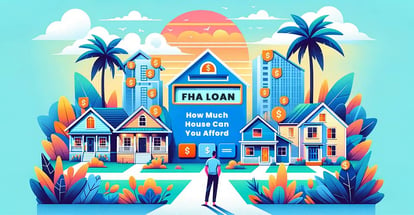FHA Loans for Seniors in Florida - Eligibility, Requirements, FAQs
There's a common misconception that age or retirement status might limit one's ability to secure a mortgage. However, this is not the case when it comes to FHA loans.
In this blog, we will delve into how senior citizens in Florida can qualify for an FHA loan using their retirement income. Contrary to popular belief, the absence of a traditional job does not disqualify seniors from obtaining an FHA loan.
Retirement income is often a perfectly acceptable alternative to employment income in the eyes of lenders. We aim to provide clear, concise information to help you understand the eligibility criteria and requirements and answer frequently asked questions about FHA loans for seniors.
Whether you are a senior citizen or assisting a loved one in their quest for a suitable home loan, this guide will be a valuable resource in your journey.
How Does FHA Define What is a Senior?
When considering lending options for individuals, the Federal Housing Administration (FHA) has a specific definition of a senior. This definition is crucial in understanding who is eligible for certain mortgage products for older adults.
According to FHA guidelines, a senior is typically identified as an individual who has reached retirement age. This age can vary, but generally, it aligns with the societal norms of retirement age, which is often around 65 years old.
However, the FHA's definition goes beyond just age. A crucial aspect of this definition is the individual's financial situation.
Specifically, the FHA looks for seniors with stable retirement income. This income is a key factor in the mortgage qualification process. This requirement ensures the senior has a consistent flow of funds to meet the mortgage obligations over time.
It's important to note that retirement income can come from various sources. This can include pensions, retirement accounts like 401(k)s or IRAs, social security benefits, or any other steady income received during retirement.
The FHA scrutinizes these income sources to determine their stability and reliability, ensuring that they will likely continue over the long term, thus supporting mortgage repayment.

FHA Loan Options for Seniors in Florida
In Florida, seniors can access various FHA loan options tailored to their specific needs and circumstances. These loans offer flexibility and financial support, allowing older residents to secure housing or finance other significant life projects.
Here’s a detailed look at the FHA loan options available to Florida's senior citizens:
-
FHA 203b Loan: This is the most common FHA loan, ideal for Florida seniors looking to buy a single-family home. The FHA 203b loan offers manageable down payments and lenient credit requirements, making it a practical choice for seniors on a fixed income.
-
FHA Refinance: Senior homeowners in Florida can use this option to refinance their existing mortgages. It’s especially beneficial for those seeking to lower their interest rates or monthly payments, adapt their loan terms to better suit their retirement budgets, or access home equity.
-
FHA 203k Loan: This loan is perfect for seniors in Florida who wish to purchase a home that requires renovations or repairs. It consolidates home purchase costs and remodeling into one loan, streamlining the process and making it easier to turn a fixer-upper into a comfortable retirement home.
-
FHA One Time Close Construction Loan: This loan facilitates the entire process for seniors in Florida interested in building their own homes. It combines the construction and mortgage phases into one single loan closing, ideal for those who want to design a home to their specific needs or downsize effectively.
-
FHA Home Equity Conversion Mortgage (HECM) Loan: Known more commonly as a reverse mortgage, the HECM is specifically geared towards homeowners aged 62 and older in Florida. It allows them to convert a portion of their home equity into cash, providing a significant financial resource for managing retirement expenses.
While seniors in Florida looking to avail of these FHA loans must meet the general qualifications for an FHA loan, they are exempt from the work history requirement.
This exemption recognizes that many seniors are retired and instead focus on their retirement income and other financial resources to ensure loan repayment feasibility.
These FHA loan options offer seniors in Florida a range of choices to support their housing needs. Whether buying, refinancing, renovating, building, or leveraging home equity, the FHA provides diverse and accessible mortgage solutions catered to the lifestyle and financial circumstances unique to retirees in the Sunshine State.
FHA Loans for Seniors in Florida – FAQ
FHA loans offer a range of possibilities for seniors in Florida, addressing various needs and circumstances. To help clarify the options and requirements, here are some frequently asked questions about FHA loans for seniors:
-
Can a 70-year-old get a 30-year mortgage in Florida? Yes, a 70-year-old can qualify for a 30-year mortgage in Florida. FHA loans do not have age limits, and anti-discrimination laws prevent lenders from denying a mortgage based on the applicant's age. The key is meeting the minimum requirements of the mortgage.
-
Can a retired person in Florida get an FHA loan? Absolutely. A retired individual can apply for and potentially get approved for any available FHA loan programs in Florida. The primary consideration will be their retirement income and financial stability.
-
Is it possible to get an FHA loan on Social Security income in Florida? Yes, seniors in Florida can qualify for an FHA loan using their Social Security income, provided it is expected to continue for at least the next two years. This income will be evaluated as part of the overall financial assessment for the loan.
-
What types of properties can be purchased with an FHA loan in Florida? FHA loans in Florida can purchase single-family homes, FHA-approved condos, and manufactured homes. The property must meet specific safety and livability standards.
-
Are there special refinance options for seniors with an FHA loan in Florida? Seniors in Florida with an FHA loan have access to FHA refinance options, including the streamlined refinance for lowering interest rates and the cash-out refinance for accessing home equity.
-
How does a senior's credit score affect FHA loan eligibility in Florida? While FHA loans generally have more lenient credit requirements, a good credit score can still significantly affect loan terms. Seniors should aim for a credit score of at least 580 to qualify for the best terms.
-
Can Florida seniors use gift funds for FHA loan down payments? Yes, FHA loans allow down payments to be covered partially or entirely by gift funds as long as the source of these funds is properly documented.
-
What are the income documentation requirements for seniors applying for an FHA loan in Florida? Seniors must provide income documentation, including pension statements, Social Security income statements, and any other relevant income documentation.
-
Is there a maximum loan amount for FHA loans for seniors in Florida? Yes, FHA loans have maximum loan limits that vary by county in Florida. Seniors should check the current limits for their specific area.
-
Can a senior in Florida apply for an FHA loan online? Many lenders in Florida offer online applications for FHA loans. Seniors can apply online, though discussing with a loan officer for tailored advice is advisable.
By understanding these FAQs, seniors in Florida can better navigate the FHA loan process, ensuring they find the mortgage solution that best fits their retirement lifestyle and financial situation.
FHA Employment Requirements For Seniors in Florida
Regarding FHA loans in Florida, seniors are given special consideration regarding employment requirements. Understanding these requirements is key for Florida's senior citizens exploring FHA mortgage options.
Here's a closer look at what Florida seniors need to know about FHA employment requirements:
No Employment Necessary for Qualification
The primary advantage for seniors in Florida is that there are no specific employment requirements to qualify for an FHA loan.
This means that seniors do not need a job to be eligible. The crucial factor is whether their retirement income is sufficient to qualify for the mortgage.
This retirement income can come from various sources, such as pensions, Social Security benefits, retirement accounts, or other reliable and steady income streams.
Working During Retirement is Allowed
If seniors in Florida choose to work during their retirement, this is perfectly acceptable under FHA guidelines. Many seniors opt for part-time employment during retirement for various reasons, including supplemental income or personal fulfillment.
This part-time employment will not hinder their ability to qualify for an FHA loan as long as their total income meets the loan requirements. For more detailed information on this aspect, seniors can refer to guidelines for obtaining an FHA loan with a part-time job.
Recently Retired Seniors are Also Eligible
Seniors in Florida who have recently retired or are just about to retire can still be approved for an FHA loan. The FHA understands that retirement is a significant life transition, and thus, they accommodate those who are in the process of transitioning to a retirement income.
The key is demonstrating that the retirement income is stable and sufficient to cover the mortgage payments.
FHA Income Requirements for Seniors in Florida
Understanding the FHA income requirements is crucial for Florida seniors considering an FHA loan for their housing needs. When applying for a mortgage, seniors focus primarily on their retirement income, which is pivotal in the qualification process.
Here's an overview of what Florida seniors need to know about FHA income requirements:
The cornerstone of these requirements is that the retirement income of a senior must be sufficient to qualify for the mortgage they are applying for. This means the income must be high enough to cover the mortgage payments and any other financial obligations.
This income must be steady and reliable, with an expectation that it will continue for at least the next two years. This assurance of continuity is key to meeting the FHA's criteria.
Furthermore, there's an added advantage for seniors in Florida who are still employed, either full-time or part-time, or those who have taken up a side job during retirement.
The FHA allows the combination of retirement income and employment income when assessing financial eligibility for a loan. This means that any additional earnings from a job can be added to the retirement income to strengthen the mortgage application.
Another critical factor for seniors in Florida to consider is the debt-to-income ratio. For an FHA loan, seniors' maximum allowable debt-to-income ratio is 56.9%.
This ratio measures a senior's ability to manage monthly payments and debts, including the mortgage, with their income. A higher income can lead to a more favorable debt-to-income ratio, increasing the likelihood of loan approval.
HECM Program for Seniors in Florida
The Home Equity Conversion Mortgage (HECM) program, offered by the Federal Housing Administration (FHA), is a specialized option for seniors in Florida looking to manage their financial needs in retirement.
Often referred to as a reverse mortgage, the HECM program is designed to provide seniors with access to equity in their homes.
This program is particularly structured as a refinance option, meaning it's not applicable for purchasing new property. Instead, it allows seniors in Florida to convert a portion of their home equity into cash.
This can be a valuable resource for various purposes, such as covering living expenses, paying bills, funding home improvements, or even supporting leisure activities in retirement.
One of the most significant aspects of the HECM program is that it does not require monthly mortgage payments. This is a crucial factor for seniors on a fixed income and looking for ways to reduce their monthly expenses.
The loan balance, which includes the cashed-out equity and accrued interest, is typically not repaid until the home is sold. This could be when the homeowner decides to move, or it may not occur until after the homeowner's passing, at which point the estate handles the repayment.
The HECM program in Florida offers seniors a financial tool to leverage their most significant asset—their home—without the immediate financial burden of monthly loan repayments.
It's a strategic option for those who have built up substantial home equity and are seeking ways to make it work for them in their retirement years.
Bottom Line
In conclusion, the common misconception that age or retirement status might limit one’s ability to secure a mortgage does not apply to FHA loans. As we have explored in this blog, senior citizens in Florida have various opportunities to qualify for an FHA loan using their retirement income.
The absence of a traditional job is not a barrier; instead, retirement income is often a perfectly acceptable alternative to employment income in the eyes of lenders.
We have aimed to provide clear and concise information to help you understand the eligibility criteria and requirements for FHA loans for seniors in Florida.
Through answering frequently asked questions and detailing specific FHA loan options, we hope to have illuminated the path for senior citizens or those assisting them in their quest for a suitable home loan.
Whether through standard FHA loans, refinancing options, specialized programs like the HECM, or understanding employment and income requirements, numerous avenues are available for seniors in Florida to secure a mortgage.
With over 50 years of mortgage industry experience, we are here to help you achieve the American dream of owning a home. We strive to provide the best education before, during, and after you buy a home. Our advice is based on experience with Phil Ganz and Team closing over One billion dollars and helping countless families.

About Author - Phil Ganz
Phil Ganz has over 20+ years of experience in the residential financing space. With over a billion dollars of funded loans, Phil helps homebuyers configure the perfect mortgage plan. Whether it's your first home, a complex multiple-property purchase, or anything in between, Phil has the experience to help you achieve your goals.


 By
By  Edited by
Edited by 






